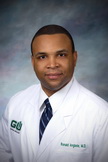Dr. Ronald Anglade
Listen to a recording of the show.
Dr. Ronald Anglade
Dr. Anglade is a native of New York. He received his undergraduate degree from Brown University, Providence, RI. He then returned to New York and received his medical degree from the State University of New York Health Science Center at Brooklyn (Downstate Medical Center).
He completed a residency in surgery and urology at the Boston University School of Medicine. He stayed on in Boston as faculty and received additional training by Dr. Irwin Goldstein, one of the world’s experts in sexual dysfunction. He also completed a postgraduate fellowship in male infertility and microsurgery.
His research interests include genetic causes of male infertility. He served as a visiting scientist in the lab of Dr. David Page at the MIT/Whitehead Institute for Biomedical Research in Cambridge, Massachusetts. The focus of his work included the impact of Y chromosome microdeletions on normal sperm production.
He is currently on staff at Emory Eastside Medical Center, Gwinnett Medical Center, Northside Hospital, Crawford-Long Hospital, and Dekalb Medical Center.
Dr. Anglade is a member of the American Urological Association, The Society for the Study of Male Reproduction, the American Society for Reproductive Medicine, and the Society for Male Reproduction and Urology.
Reproductive Health
Fact vs. Fiction
- Boxers vs briefs
- Use it or lose it. Decreased sexual activity and ability can lead to further decreased erectile ability.
- Testosterone replacement can never be given with a prior history of prostate cancer. There are exceptions.
- IVF can lead to an increased risk of ovarian cancer.
- Infertility is more common in women (40:40:20, male:female:both)
- Do all your lovemaking on ovulation day.
- After adoption, couples often get pregnant (incidence is no different).
- Once a parent, a male or female cannot be infertile (i.e. difficult conception in which one partner has already been a parent).
- Raising the female hips following ejaculation raises the chance of conception.
- Radiation exposure – laptop, cell phone in pocket, etc.
Reproductive Health Talking Points
- Do both parents work? Discuss this is a couples issue. Evaluations often performed simultaneously, even when an abnormality has been found.
- Environmental issues (see myth vs fact)
- Hormonal issues of fertility.
- Other symptoms of hormonal imbalance.
- Fatigue
- Erectile dysfunction
- Decreased lean body mass
- Bone loss
- Other conditions associated with hormonal imbalance.
- Metabolic syndrome/insulin receptor insensitivity
- Vitamin D deficiency
- Hyperlipidemia
- Depression
- Treatment of ED when testosterone is not the issue
- Different treatment options
- Following prostate cancer treatment (surgery or radiation)
- Erectile rehabilitation
- Fertility following chemotherapy
- Impact of obesity and smoking on fertility
- Interesting links



